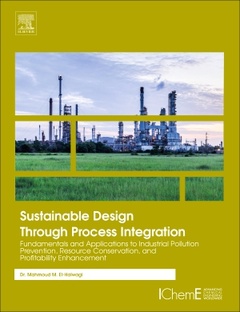Description
Sustainable Design Through Process Integration (2nd Ed.)
Fundamentals and Applications to Industrial Pollution Prevention, Resource Conservation, and Profitability Enhancement
Author: El-Halwagi Mahmoud M.
Language: English
Subject for Sustainable Design Through Process Integration:
Keywords
Applications; Biorefineries; Break-even analysis; Case studies; Cash flow diagrams; Cogeneration; Combined heat and power; Combined mass and heat integration; Condensation; Cost estimation; Desalination; Design; Direct recycle; Eco-industrial parks; Energy integration; Functionality; Heat exchange networks; Heat exchanger network; Heat integration; Heat-induced separation; In-plant waste reduction; Integration; Integration projects; Interception; LINGO; Life cycle; Macroscopic systems; Mass exch
Approximative price 146.54 €
In Print (Delivery period: 14 days).
Add to cartSupport: Print on demand
Description
/li>Contents
/li>Readership
/li>Biography
/li>Comment
/li>
Sustainable Design through Process Integration: Fundamentals and Applications to Industrial Pollution Prevention, Resource Conservation, and Profitability Enhancement, Second Edition, is an important textbook that provides authoritative, comprehensive, and easy-to-follow coverage of the fundamental concepts and practical techniques on the use of process integration to maximize the efficiency and sustainability of industrial processes. The book is ideal for adoption in process design and sustainability courses. It is also a valuable guidebook to process, chemical, and environmental engineers who need to improve the design, operation, performance, and sustainability of industrial plants. The book covers pressing and high growth topics, including benchmarking process performance, identifying root causes of problems and opportunities for improvement, designing integrated solutions, enhancing profitability, conserving natural resources, and preventing pollution. Written by one of the world?s foremost authorities on integrated process design and sustainability, the new edition contains new chapters and updated materials on various aspects of process integration and sustainable design. The new edition is also packed with numerous new examples and industrial applications.
- Allows the reader to methodically develop rigorous targets that benchmark the performance of industrial processes then develop cost-effective implementations
- Contains state-of-the-art process integration and improvement approaches and techniques including graphical, algebraic, and mathematical methods
- Covers topics and applications that include profitability enhancement, mass and energy conservation, synthesis of innovative processes, retrofitting of existing systems, design and assessment of water, energy, and water-energy-nexus systems, and reconciliation of various sustainability objectives
1. Introduction to Sustainability, Sustainable Design, and Process Integration
2. Overview of Process Economics
3. Benchmarking Process Performance Through Overall Mass Targeting
4. Direct-Recycle Networks: Graphical and Algebraic Targeting Approaches
5. Synthesis of Mass-Exchange Networks
6. Combining Mass-Integration Strategies
7. Heat Integration
8. Integration of Combined Heat and Power Systems
9. Synthesis of Heat-Induced Separation Network for Condensation of Volatile
10. Property Integration
11. Overview of Optimization
12. An Optimization Approach to Direct Recycle
13. Synthesis of Mass-Exchange Networks: A Mathematical Programming Approach
14. Synthesis of Reactive Mass-Exchange Networks
15. Mathematical Optimization Techniques for Mass Integration
16. Mathematical Techniques for the Synthesis of Heat-Exchange Networks
17. Synthesis of Combined Heat and Reactive Mass-Exchange Networks
18. Water- Energy Nexus for Thermal Desalination Processes
19. Design of Membrane-Separation Systems
20. Macroscopic Approaches of Process Integration
21. Concluding Thoughts: Launching Successful Process-Integration Initiatives and Applications
Appendix I: Conversion Relationships for Concentrations and Conversion Factor for Units
Appendix II: Modeling of Mass-Exchange Units for Environmental Applications
Index
Practicing chemical and process engineers; plant and process designers; environmental and energy engineers; academics, researchers and students of chemical engineering.
- Allows the reader to methodically develop rigorous targets that benchmark the performance of industrial processes then develop cost-effective implementations
- Contains state-of-the-art process integration and improvement approaches and techniques including graphical, algebraic, and mathematical methods
- Covers topics and applications that include profitability enhancement, mass and energy conservation, synthesis of innovative processes, retrofitting of existing systems, design and assessment of water, energy, and water-energy-nexus systems, and reconciliation of various sustainability objectives




